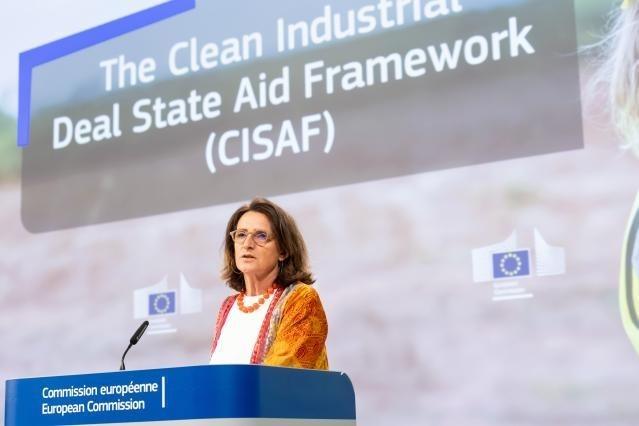
EU Eases Ability to for Member States to Fund Cleantech, Industrial Decarbonization Sectors

The European Commission announced the adoption of its new Clean Industrial Deal State Aid Framework (CISAF), aimed at enabling Member States to provide support for goals including clean energy development, industrial decarbonization and clean technology.
Key aspects of the new framework include the ability to provide significant electricity price support for companies in energy-intensive sectors, as well as funding to support the buildout of cleantech sectors.
The new framework follows the launch earlier this year by the Commission of the Clean Industrial Deal, introducing a series of measures aimed at accelerating decarbonization while supporting manufacturing in Europe, and addressing key challenges including climate change and industrial competitiveness.
As part of the Clean Industrial Deal, the Commission also proposed a series of measures to help finance the green transition, with plans to adopt a Clean Industrial Deal State Aid Framework allowing for quicker approval of State aid measures for the roll-out of renewable energy and ensure sufficient manufacturing capacity of clean tech.
The new CISAF framework simplifies state aid rules for five key target areas, including the roll-out of renewable energy and low-carbon fuels, temporary electricity price relief for energy-intensive users to ensure the transition to low-cost clean electricity, decarbonization of existing facilities, the development of clean tech manufacturing capacity, and de-risking support private investment in areas across clean energy, decarbonization, clean tech, energy infrastructure projects and projects supporting the circular economy.
Among the key aspects of the framework is the introduction of temporary price relief for energy-intensive users, aimed at addressing the high costs facing EU companies relative to competitors in places will less ambitious climate policies. The EU’s approach enables support covering up to half of the wholesale price of half of annual electricity demand, effectively reducing electricity costs by up to 25%.
The framework also enables backing for “key enabling industries,” covering all technologies under the Net Zero Industry Act, allowing member states to provide funding for investments such as new production lines, new machinery or to license technology.
In order to de-risk private investments in projects covered by the framework, the CISAF also allows member states to provide support such as equity, loans or guarantees provided to a dedicated fund or special purpose vehicle that will hold the portfolio of eligible projects.
The new CISAF framework will be in place through the end of 2030.
Teresa Ribera, Executive Vice-President for Clean, Just and Competitive Transition, said:
“If Europe wants to lead in clean tech, we must act with courage and clarity. The new framework simplifies and speeds up support for decarbonisation, but it goes further: it recognises the state as a strategic investor in our future. It’s a tool to drive climate ambition, strengthen Europe’s resilience, and ensure our industry remains globally competitive. And we do this while defending the integrity of our Single Market, avoiding distortions, and making our energy systems more stable, affordable, and fair.”